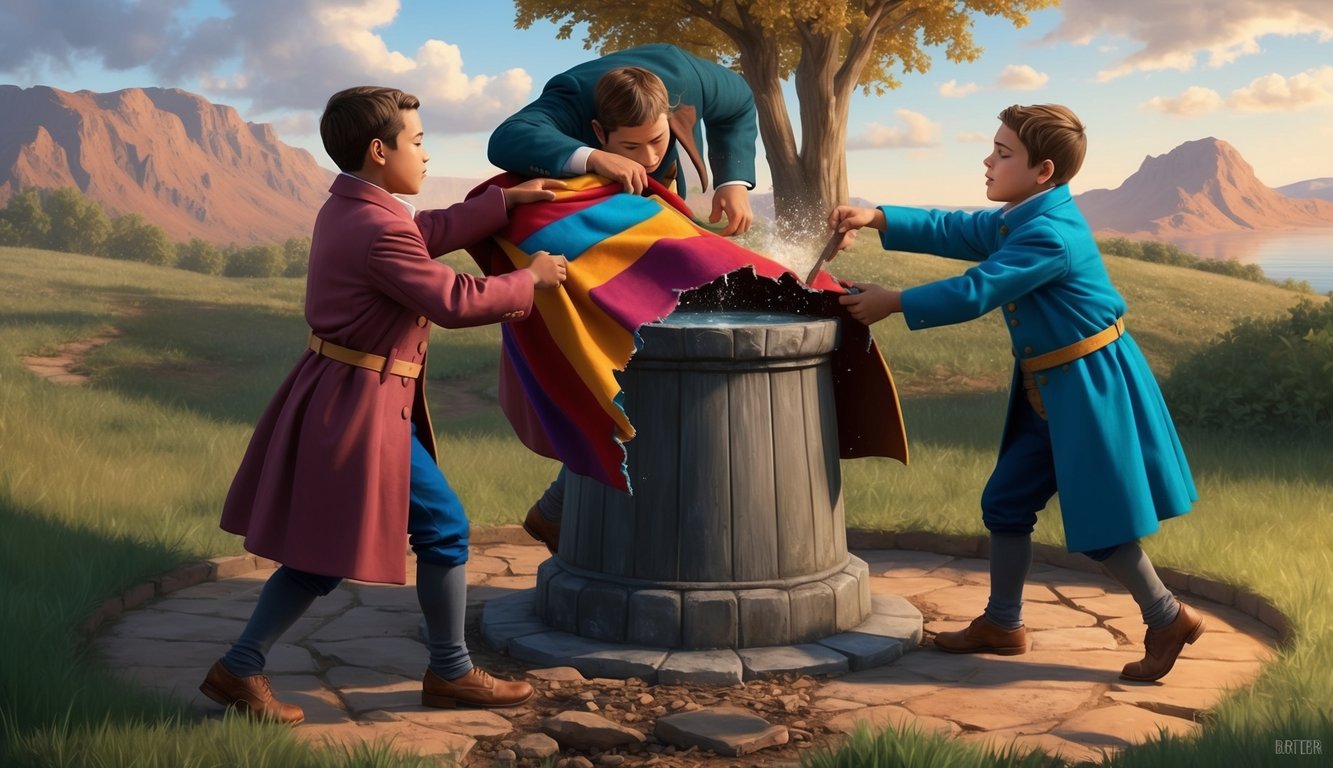Don’t Miss Out On This Unique Astrological Opportunity
Are you tired of spinning your wheels and getting nowhere? Simply put, you’re out of sync: you’re out of alignment with your astral configuration.
But: there’s a kind of map that can help you reclaim your alignment. Think of it as your own personal blueprint to success and happiness: a blueprint that will help you live your most amazing life.
Get started here.
Genesis 37 tells the intriguing story of Joseph, a young man with a remarkable destiny.
You get to meet Joseph, who, at just seventeen, stirred the pot in his family with dreams that hinted he would one day rule over his brothers.
These dreams, shared with his family, became the seeds of jealousy and hostility.
Joseph’s brothers, driven by envy, took a drastic step to get rid of him.
Seizing an opportunity, they decided to sell Joseph into slavery. This act of betrayal took Joseph from his homeland to the far reaches of Egypt, forever changing his path. The brothers covered their actions by deceiving their father, Jacob, leading him to believe in a tragic fate for his cherished son.
In Egypt, Joseph’s journey continued as he became a servant in Potiphar’s household, setting the stage for his future rise.
Genesis 37 isn’t just a biblical tale; it’s a captivating story of dreams, betrayal, and the unforeseen ways destiny unfolds.
As you explore this chapter, you’ll uncover themes of ambition, family conflicts, and resilience that resonate even today.
Key Takeaways
- Joseph’s dreams sparked jealousy among his brothers.
- Joseph was sold into slavery and taken to Egypt.
- The brothers deceived Jacob about Joseph’s fate.
The Family of Jacob and Joseph’s Early Life
Jacob’s family was full of tension and favoritism, shaping Joseph’s early life in notable ways.
Joseph was favored by his father but faced jealousy from his brothers.
His dreams, which suggested a future where his family would bow to him, heightened this discord.
Joseph’s Relationship with His Brothers and Jacob
Jacob, also called Israel, lived in Canaan with his family, including many sons.
Joseph, at 17, was his favorite.
He spent time with his brothers, the sons of Bilhah and Zilpah.
Jacob’s favoritism was clear, making his other sons resent Joseph.
Joseph often reported his brothers’ actions to Jacob, and his father trusted him more.
This created more friction.
Feelings of jealousy turned to hate among the brothers, intensifying their distrust and animosity.
The bond between Jacob and Joseph thus set the stage for later conflicts.
Dreams of Grandeur and Their Significance
Joseph shared dreams that hinted at future success and dominance.
In one dream, his brothers’ sheaves of grain bowed to his.
In another, the sun, moon, and stars bowed to him.
These dreams were seen as signs of his ambition and leadership potential. To his brothers, they were irritants. His dreams made them feel overshadowed.
Dreams carried weight as they often symbolized divine messages.
To Joseph, they were glimpses of destiny; to his family, they became sources of conflict.
This dreaming habit of his was pivotal in his story, shaping relationships and foretelling his journey.
Betrayal and The Plot Against Joseph
Joseph’s story in Genesis 37 is filled with tension and drama.
His brothers’ jealousy reaches a boiling point, leading to a scheme to kill him.
Instead, he is sold for silver to traders headed to Egypt.
Two brothers, Reuben and Judah, play key roles in this twist of fate.
Joseph’s Brothers’ Jealousy and the Plan to Kill Him
Joseph was adored by his father, Jacob, more than his other sons.
This favoritism, combined with Joseph’s vivid dreams of becoming a leader, sparked intense jealousy among his brothers.
These dreams suggested that Joseph would one day rule over them, which made them angry and envious.
One day, Joseph’s brothers spotted him approaching them in Dothan.
The sight of him fueled their resentment, and they conspired to kill him.
They saw his death as a way to stop his dreams from coming true.
Their plan included throwing him into a cistern, a pit with no water, leaving him to die without a trace.
The Transaction with the Ishmaelites and Midianites
Instead of killing Joseph, the brothers noticed a caravan of Ishmaelite and Midianite merchants traveling to Egypt.
They seized the opportunity to profit and decided to sell Joseph.
Joseph was sold for twenty pieces of silver.
This transaction allowed the brothers to rid themselves of Joseph while avoiding the guilt of murdering him.
The merchants, carrying spices and grain, continued to Egypt with Joseph bound as their slave.
Through this trade, Joseph’s life dramatically shifted from being a cherished son to a slave in a foreign land.
Reuben and Judah’s Roles in Joseph’s Fate
Reuben, the eldest brother, had a different plan.
He hoped to rescue Joseph later and return him to Jacob.
His intention was to save his brother, showing some mercy amidst the betrayal.
However, he wasn’t present when Joseph was sold.
Judah suggested selling Joseph to the merchants, arguing that they should not kill their own brother.
His proposal aimed to avoid spilling blood while also disposing of Joseph.
This act set the wheels in motion for Joseph’s eventual destiny in Egypt.
After the sale, the brothers dipped Joseph’s coat in goat’s blood.
They presented it to Jacob, pretending Joseph had been killed by an animal.
Jacob mourned deeply, unable to be comforted, believing he had lost his beloved son forever.
The Deception of Jacob

In Genesis 37, Jacob is deceived by his own sons who make him believe that his beloved son Joseph has been killed.
They present false evidence to support their claim, plunging Jacob into deep despair and mourning.
The Presentation of the Bloodied Robe
You witness the moment when Jacob’s sons present him with Joseph’s robe of many colors, now stained with blood.
This robe, once a symbol of Jacob’s favoritism toward Joseph, becomes the evidence of a supposed tragedy.
The brothers soak it in the blood of a goat to fabricate a story that Joseph was torn to pieces by a wild animal.
This deception works as planned.
The sight of the bloodied robe convinces Jacob that his son is dead.
It’s a calculated move by Joseph’s brothers to hide their betrayal.
The choice of using a goat is significant, echoing Jacob’s own past deception of his father using similar methods.
Jacob’s Despair and Mourning
When you delve into Jacob’s reaction, it’s heart-wrenching.
He tears his clothes and puts on sackcloth, traditional signs of grief during biblical times.
For days, Jacob mourns Joseph’s supposed death, refusing to be comforted by his other children.
This period of mourning marks a profound personal and family crisis.
In his despair, Jacob talks about wanting to join Joseph in the grave, showing the depth of his sorrow.
His grief is palpable, affecting not just him but the entire household.
This deception changes Jacob’s life, and his refusal to be comforted underscores his broken heart.
Jacob’s mourning is a pivotal moment, as it shows the emotional toll of deception and the depth of a father’s love for his lost son.
Joseph’s Arrival in Egypt

Joseph’s journey to Egypt begins after being sold by his brothers.
He ends up in the household of Potiphar, a high-ranking official.
This experience marks the start of profound changes in Joseph’s life.
Sold into Potiphar’s Household
You learn that Joseph’s brothers sold him for twenty shekels to traders who took him to Egypt.
Upon arrival, Joseph was sold to Potiphar, the Captain of the Guard.
Joseph quickly stands out to Potiphar.
Recognizing Joseph’s abilities, Potiphar entrusts him with more responsibilities in his household.
Despite his initial despair, Joseph excels, demonstrating integrity and skill.
His presence positively impacts Potiphar’s home.
Challenges remain, but Joseph’s resilience is noteworthy.
Even when rebuked, his dedication earns him respect.
In Potiphar’s household, Joseph’s journey truly begins, filled with both difficulties and triumphs.
Frequently Asked Questions

Genesis 37 tells the story of Joseph, highlighting themes like favoritism, jealousy, and forgiveness.
The chapter shows how Joseph’s experiences and relationships deeply impact his life journey and family dynamics.
What is the significance of Joseph’s coat of many colors?
Joseph’s coat, given by his father, Jacob, symbolizes favoritism.
This special gift highlights Jacob’s preference for Joseph out of all his sons.
This favoritism fuels his brothers’ jealousy and tension in the family.
The coat becomes a pivotal element, as it leads to their harmful actions against Joseph.
Can you explain the meaning behind Joseph’s dreams in this chapter?
Joseph has two dreams that indicate future events.
In the first dream, his brothers’ sheaves of grain bow down to his.
In the second, the sun, moon, and eleven stars bow to him.
These dreams suggest that Joseph will rise to a position of power, which increases his brothers’ envy.
How did Joseph’s relationship with his brothers lead to the events in Genesis 37?
Joseph’s relationship with his brothers is strained largely due to his father’s favoritism and his own dreams.
Sharing his dreams with his brothers only heightens their resentment.
This tension ultimately results in their plot against him, which includes throwing him into a pit and selling him into slavery.
What does the story of Genesis 37 teach us about jealousy and its effects?
The story demonstrates how jealousy can lead to destructive actions.
Joseph’s brothers, driven by envy, betray him.
Their jealousy causes them to harm their own family.
This serves as a warning about the dangerous consequences of letting jealousy go unchecked.
How is forgiveness portrayed in the story of Joseph and his brothers?
While forgiveness is more explicitly addressed in later chapters, Genesis 37 sets the stage.
Despite their actions, Joseph eventually forgives his brothers.
His willingness to forgive them, even after their betrayal, is a powerful aspect of his character that evolves throughout the narrative.
How is the narrative of Genesis 37 relevant to modern readers?
The themes in Genesis 37, like jealousy, forgiveness, and favoritism, are still relevant today.
Many people experience family dynamics similar to Joseph’s. Understanding these themes gives insight into addressing personal and familial conflicts and encourages forgiveness and reconciliation.
The story of Ruth in the Bible also highlights themes of loyalty, perseverance, and redemption, which complement the lessons from Genesis 37.
Both stories teach valuable moral principles that can guide individuals in navigating complex relationships.
By reflecting on these biblical narratives, people can find encouragement to practice humility, forgiveness, and compassion in their own lives.



